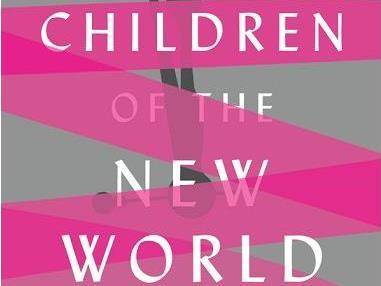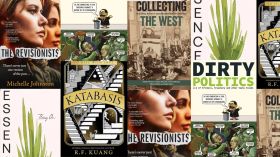Cover Art: Children of the New World By Alexander Weinstein. Image via Text Publishing.
The blurred line separating who we are from the hard and soft technology we use every day has become an ever more prominent cause célèbre. From films like The Matrix, Her, Ex Machina, even Ironman and TV shows like Black Mirror and West World two things become clear. Firstly, the screen has asserted it’s primacy for telling the stories of our intertwining – and one can understand why (more on that later). Secondly, it’s not going to end well. But why the pessimism? There has been a surprising paucity of literature to investigate what is not only a common cause of anxiety but one of the largest influence on how we communicate, think, even love. It is into this largely unoccupied space that Children of the New World arrives with stories that artfully claw at our complacency and explore, with insight and wit, the human side of the human/technology equation that comprises who we are.
The tendency towards dystopianism is equally prevalent in Weinstein’s stories, which look at the fault lines in our relationship with technology. It runs a broad subject matter from ambiguous relationships with androids, digital drugs and manipulable memory to environmental degradation and the social costs of automation. Weinstein has a wonderful ability to thread semblances of normality through each story, which both grounds them and offers a subtle juxtaposition with their near-future settings. It’s hard to go past ‘The Cartographers’ as the stand-out story for its ability to warp your sense of reality in the same way as technological disruption does for its characters.
Human experience in the Brave New World of integrated technology is a uniquely challenging task for a writer because words are ill-equipped for what a predominantly visual medium. Language on the internet, particularly on social media is more conversational than anything else. We write like we speak because of the rapid response time and disposability of our online interactions. This means that the visual frame of those interactions set context, whether Facebook Chat head, Tinder messaging or Twitter feed. The words stripped of their visual pane would be like reading a transcript of a conversation.
Weinstein’s clear and simple prose, his pacing and his willingness to adopt irregular language are key to taking the reader from the analogue pages of a paper and ink book to the digital world it speaks to. You’ll struggle to find better examples of it in ‘Excerpts from The New World Authorised Dictionary’ and ‘A Brief History of The Failed Revolution’. It was something that Dave Eggers also executed well in The Circle to create the language triggers that get our minds thinking digital rather than purely literary language.
Short stories seem to be the main avenue of approach for tech-specific speculative fiction and others like Doug Coupland in his recent Bit Rot have taken the same approach. For reasons mentioned above it makes sense in some ways. The language and pacing of the tech world make it hard to keep engaged over a novel length effort but the preference for a shorter medium comes at the same price of brevity online: a loss of depth. The stories Weinstein crafts are intriguing and the issues they touch on begging for him to plunge deeper. It would be no easy feat but taking just one of the stories in Children of the New World and expanding it into a book of its own is a tantalising prospect.
Then again, this is the precise desire that keeps us logging back on and trying to get closer, online, to the connection and intimacy of ordinary human relationships. Children of the New World is the kind of unsettling read that is a compulsive and confusing pleasure. It pulls just far enough ahead to offer perspective without straining relatability and then deposits you back into a comfortable reality that feels slightly less so.
Rating: 4 out 5 stars
Children of the New World
By Alexander Weinstein
Text Publishing
Extent: 240pp
Format: Paperback
Text publication date: 31 October 2016
ISBN: 9781925498387
AU Price: $22.99
Categories: Fiction Short Stories






